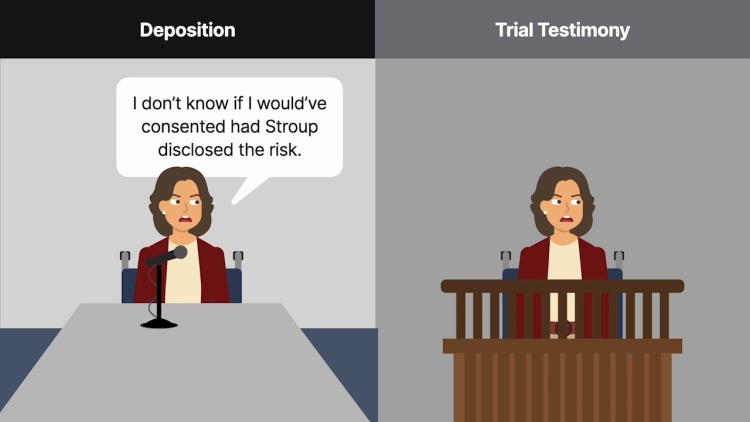Ashe v. Radiation Oncology Associates
Tennessee Supreme Court
9 S.W.3d 119 (1999)

- Written by Josh Lee, JD
Facts
Patricia Ashe (plaintiff) was diagnosed with breast cancer and had a double mastectomy and chemotherapy. A few years later, Ashe developed a lung tumor. Ashe then had the upper portion of her lung removed. Ashe was referred to Dr. Steven Stroup (defendant) for potential radiation therapy. Dr. Stroup recommended radiation therapy. However, Dr. Stroup did not tell Ashe that there was a chance that radiation therapy might cause an injury to her spinal cord. Ashe agreed to the radiation therapy and suffered a serious injury to her spinal cord, resulting in Ashe becoming a paraplegic. Ashe sued Dr. Stroup for medical malpractice and failure to obtain informed consent. Dr. Stroup testified that the chance of spinal-cord injury from the treatment was less than 1 percent. Ashe presented an expert opinion from another doctor, who testified that the chance was 1 to 2 percent and that the applicable standard of care required a doctor to advise the patient of the risk. Ashe testified by deposition that she was not sure if she would have agreed to the treatment if she had been advised of the risk. Later, at trial, Ashe testified that she would not have agreed to the treatment. Based on the conflict between the testimony at trial and during her deposition, the trial court struck the trial testimony and granted a directed verdict to Dr. Stroup on the informed-consent action. Ashe appealed, and the court of appeals reversed. Dr. Stroup petitioned the Tennessee Supreme Court for review.
Rule of Law
Issue
Holding and Reasoning (Holder, J.)
What to do next…
Here's why 907,000 law students have relied on our case briefs:
- Written by law professors and practitioners, not other law students. 47,100 briefs, keyed to 996 casebooks. Top-notch customer support.
- The right amount of information, includes the facts, issues, rule of law, holding and reasoning, and any concurrences and dissents.
- Access in your classes, works on your mobile and tablet. Massive library of related video lessons and high quality multiple-choice questions.
- Easy to use, uniform format for every case brief. Written in plain English, not in legalese. Our briefs summarize and simplify; they don’t just repeat the court’s language.






